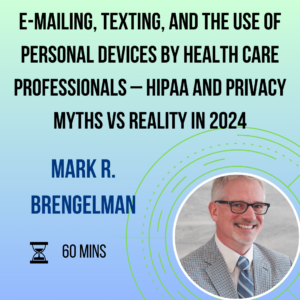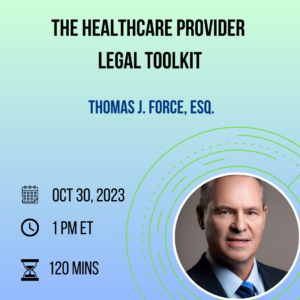Marketing and Empathy Psychology
EMTALA 2025
By - Laura A. Dixon, BS, JD, RN, CPHRM
Lorem ipsum dolor sit amet, consectetur adipiscing elit. Ut elit tellus, luctus nec ullamcorper mattis, pulvinar dapibus leo.
- 06 Aug - 21 Oct 2022
- 10:00 - 12:00
- June 5, 2025 | Available all day |
- 90 Mins

Every hospital that has a dedicated emergency department and accepts Medicare and Medicaid payment must follow the federal law and the Center for Medicare and Medicaid Services (CMS) Conditions of Participation Interpretive Guidelines on the Emergency Medical Treatment and Labor Act (EMTALA).
Hospitals without such emergency departments must comply with EMTALA if they have specialized capabilities. For example, EMTALA can impact obstetrical patients and behavioral health patients.
This webinar will cover the CMS regulations and interpretive guidelines regarding EMTALA. It will cover all twelve sections – Tag Numbers – plus an additional section for on-call physicians and the shared and community care plan process. Also to be covered are the updated requirements for “emergency services” for obstetrical patients which became effective January 1, 2025.
This webinar will include discussion of a case that has created an enormous expansion of hospital and practitioner liability under federal law. The case, Moses v. Providence Hospital and Medical Centers, Inc., No. 07-2111 (6th Cir. April 2009), overruled the CMS regulation that EMTALA obligations end when the hospital admits the patient in good faith. The case illustrates the importance of understanding the role that case law has in the outcome of EMTALA litigation: patients can complain to CMS and request an investigation, or they have the option of going and directly filing a lawsuit.
It is anticipated that healthcare will see larger EMTALA fines and more activity because of the higher fines and the OIG final changes. These changes are not in the CMS CoPs and will be discussed.
Objectives
- Recall that CMS has a manual on EMTALA that all hospitals that accept Medicare must follow.
- Describe the requirement that hospitals must maintain a central log.
- Discuss the hospital’s requirement to maintain a list of the specific names of physicians who are on call to evaluate emergency department patients.
- Describe the CMS requirements on what must be in the EMTALA sign.
- Discuss when the hospital must complete a certification of false labor
Agenda
- Introduction and History of EMTALA
- Basic concept of EMTALA
- History of EMTALA
- Recent court cases
- CMS Conditions of Participation – EMTALA
- EMTALA sign requirements
- To whom EMTALA applies
- Reasonable registration process
- Financial questions from patients
- Patients who sign out AMA
- Whistle Blower protections
- Specialized capability
- Capacity definitions
- EMTALA violations and money penalty cases
- Hospital reporting requirements – “Dumping”
- Retention of medical records
- On-call physician issues
- Community Call Plan (CCP)
- Simultaneous on-call
- Elective surgeries and on-call
- Sending a representative
- Response times
- Central log
- Special responsibilities
- Meaning of “comes to the ED”
- Definition of hospital property
- EMTALA and outpatients
- Medical screening exam
- Certification of false labor
- Born alive law and EMTALA
- Minor child request for treatment
- Ambulance and EMTALA
- Telemetry
- When diversion is allowed
- Parking of patients
- Helipad
- Qualified Medical Provider (QMP)
- Definition of Inpatient
- Moses Case
- Requests for medications
- Blood alcohol tests
- Emergency medical condition and stabilization
- OB patients and MEC
- Born-Alive Infant Protection Act and MLN clarification
Who Should Attend?
- Emergency Department Managers
- Emergency Department Physicians
- Emergency Department Nurses
- ED Medical Director
- Risk Managers
- OB Managers and Nurses
- Behavioral Health Director and Staff
- Chief Nursing Officer
- Nurse Supervisors
- Nurse Educators
- Staff Nurses
- Outpatient Directors
- Compliance Officers
- Directors of Hospital-Based Ambulance Services
- Director of registration
- Registration staff
- ED education staff
- On call physicians
- Chief Medical Officer (CMO)
- Chief Operating Officer (COO)
- Patient Safety Officer
Vulputate eros arcu magnis donec sem pretium scelerisque a etiam. Eros aliquam elit si mattis phasellus at orci letius ligula posuere. Sodales maecenas facilisis diam egestas dictumst si fames mus fermentum conubia curabitur. Ornare nisi consectetur semper justo faucibus eget erat velit rhoncus morbi.
Speaker Detail

Laura A. Dixon, BS, JD, RN, CPHRM
Laura A. Dixon recently served as the Regional Director of Risk Management and Patient Safety for Kaiser Permanente Colorado where she provided consultation and resources to clinical staff. Prior to joining Kaiser, she served as the Director, Facility Patient Safety and Risk Management and Operations for COPIC from 2014 to 2020. In her role, Ms. Dixon provided patient safety and risk management consultation and training to facilities, practitioners, and staff in multiple states. Such services included creation of and presentations on risk management topics, assessment of healthcare facilities; and development of programs and compilation of reference materials that complement physician-oriented products. Ms. Dixon has more than twenty years of clinical experience in acute care facilities, including critical care, coronary care, peri-operative services, and pain management. Prior to joining COPIC, she served as the Director, Western Region, Patient Safety and Risk Management for The Doctors Company, Napa, California. In this capacity, she provided patient safety and risk management consultation to the physicians and staff for the western United States. Ms. Dixon’s legal experience includes medical malpractice insurance defense and representation of nurses before the Colorado Board of Nursing. As a registered nurse and attorney, Laura holds a Bachelor of Science degree from Regis University, RECEP of Denver, a Doctor of Jurisprudence degree from Drake University College of Law, Des Moines, Iowa, and a Registered Nurse Diploma from Saint Luke’s School Professional Nursing, Cedar Rapids, Iowa. She is licensed to practice law in Colorado and California.
Webinar Information
- Duration : 90 Mins
- Date: June 5, 2025 | Available all day
- 06 Aug - 21 Oct 2022
- 10:00 - 12:00
- Jakarta, Indonesia
Share this event
Related products
-

E-mailing, Texting, and The Use of Personal Devices by Health Care Professionals – HIPAA and Privacy Myths vs Reality
$199.00 – $349.00 Select options -

The 2024 Healthcare Provider Legal Toolkit: Strategies For Protecting Practice and Reputation
$199.00 – $349.00 Select options -

Violence at Work: From Disgruntled Employees and Domestic Violence to Mass Murder or Active Shooter
$199.00 – $349.00 Select options -

The Disruptive Physician Practitioner: A Danger to The Hospital’s Operation
$199.00 – $349.00 Select options



